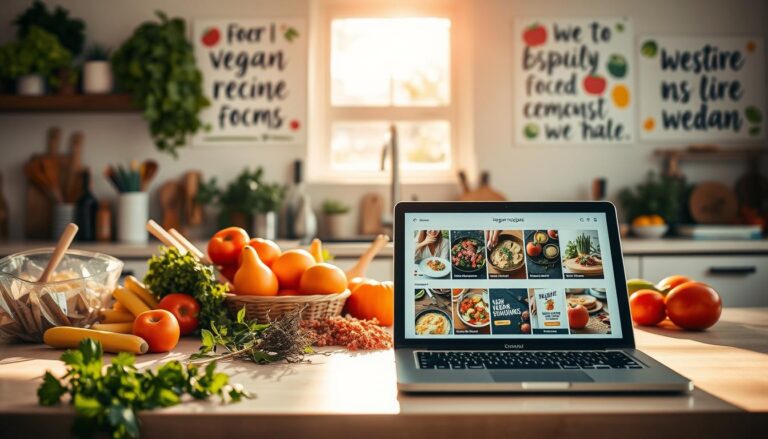How To Go Vegan: The Shocking Truth No One Tells You Until It’s Too Late
Discover essential tips on how to go vegan and unlock a healthier lifestyle. Embrace plant-based nutrition with our straightforward vegan diet guide.
Starting a vegan lifestyle is both thrilling and scary. You've heard it's good for your health, the planet, and animals. But there are things nobody tells you until you're already in. Such as how to go vegan?
This vegan diet guide will show you the real side of veganism. It's your honest guide to this big change.
Key Takeaways
- Starting a vegan lifestyle has its ups and downs.
- Learning to deal with cravings and social pressures helps.
- It's important to learn how to eat well and get all the nutrients.
- You might need to take supplements, like Vitamin B12.
- Joining vegan groups can give you support and tips.
Understanding the Initial Challenges of Going Vegan
Starting a vegan lifestyle is an exciting journey. It's important to know the first challenges you might face. With some planning and knowledge, switching to veganism can be easy.
Dealing with Cravings
One big challenge is fighting cravings for non-vegan foods. These cravings come from years of eating certain foods. When I began, I felt like I had an itch I couldn't scratch.
But, cravings lessen over time. There are many plant-based alternatives for almost every food. These can help you stay on track with a vegan diet.
Social Challenges
Another big challenge is how veganism affects social life. It can be hard at gatherings when others don't get it. You might have to explain your choices a lot, or feel left out at food-focused events.
I remember when my brother—an unapologetic steak lover—came over for dinner. I was nervous. What if he hated the food? What if he left hungry and unimpressed? But I gave it my best shot and cooked a few of my favorite vegan dishes.
To my surprise, he loved it. That smile on his face? Priceless. It reminded me that good food speaks for itself, no matter what it’s made from.
🌱 Want to see the kinds of recipes that changed his mind?
👉 Where I Find Vegan Recipes That Even Meat-Lovers Crave
But, joining a community can help a lot. You'll find support and tips for dealing with these social issues while going vegan.
Relearning How to Build Your Plate
Starting a vegan journey means changing how we make our meals. You might wonder, how do we make sure we get all the nutrients? Let's explore how to balance macronutrients and micronutrients with vegan meal planning and tasty recipes.
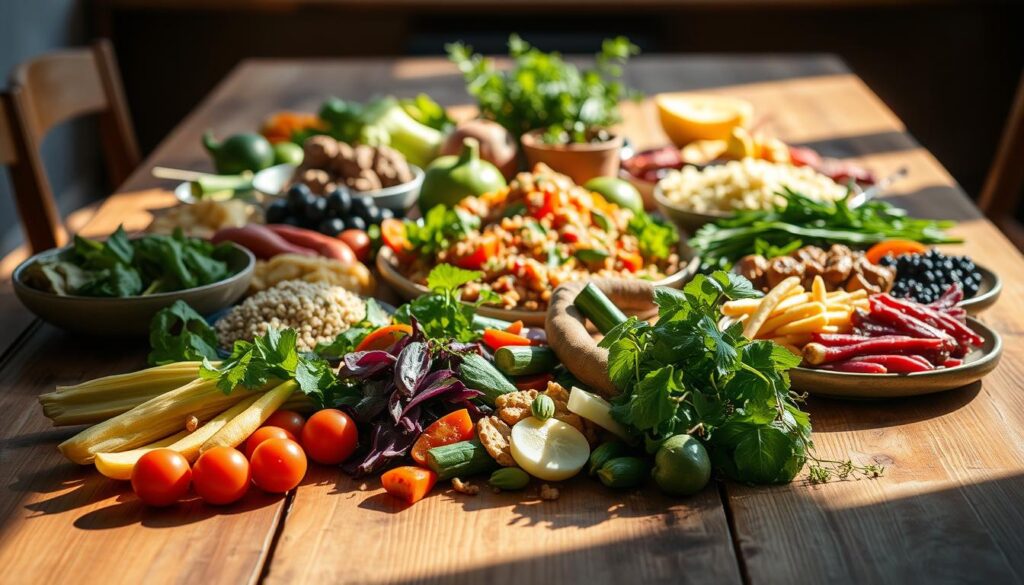
Balancing Macros and Micros
When I went vegan, I worried about getting enough nutrients. It's key to balance your macros—proteins, fats, and carbs. And don't forget about your micros—vitamins and minerals. Here's a simple guide:
| Macronutrient | Plant-Based Sources |
|---|---|
| Protein | Lentils, chickpeas, tofu, tempeh, quinoa |
| Fats | Avocado, nuts, seeds, olive oil, coconut oil |
| Carbohydrates | Whole grains, fruits, vegetables, potatoes, legumes |
By eating a variety of foods, you get all the vitamins and minerals you need. A vegan diet doesn't have to be hard.
Using Vegan Recipes
Thinking of new, healthy meals every day can feel tough. That's where vegan recipes come in. They make meal planning easy and keep your diet interesting and healthy.
Begin with simple vegan meal planning. Make a weekly menu with different dishes for each day. Include lots of colorful fruits, veggies, grains, and plant-based proteins. This will make your meals fun and keep you on track with your vegan diet.
Investing in good cookbooks or following vegan chefs online can change your cooking. Try that new quinoa salad or make a big lentil stew. You'll see how tasty and satisfying vegan meals can be!
Nutritional Concerns and Supplements
Switching to a plant-based diet can be tricky. You need to make sure you get all the vitamins and minerals. It's key to focus on plant-based nutrition to meet your needs.
The Importance of Vitamin B12
Vitamin B12 is very important for vegans. It's mostly found in animal products. So, vegans often don't get enough. To stay healthy, you need to find Vitamin B12 vegan options through vegan supplements.
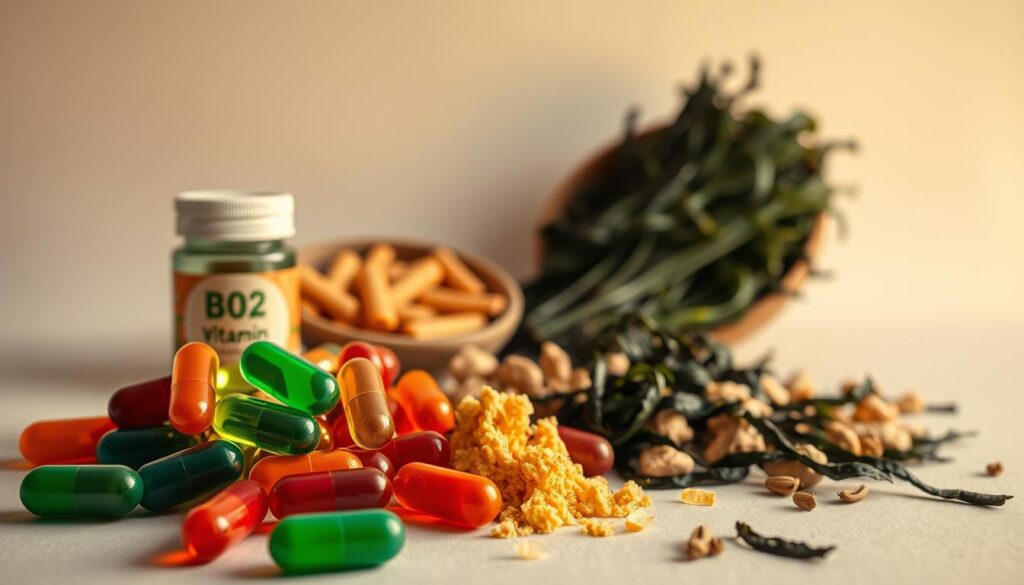
Not getting enough Vitamin B12 can cause tiredness, anemia, and brain problems. So, it's smart to eat fortified foods or take a good Vitamin B12 vegan supplement.
Plant Plate Guide by Virginia Messina
Virginia Messina, a dietitian, made the Plant Plate guide. It helps vegans make balanced meals. The guide shows how to mix food groups for all nutrients from plants.
With vegan supplements and the Plant Plate guide, you can live a healthy vegan life. It's all about making sure you get the right nutrients.
How to Go Vegan
Starting a vegan lifestyle can seem hard, but a step-by-step vegan guide makes it easy. Here's how to start your vegan diet:
- Research and Educate Yourself: Learn about vegan food, animal rights, and the planet. Watch “Forks Over Knives” and read “How Not to Die” by Dr. Michael Greger.
- Gradual Dietary Changes: Don't stop eating animal products right away. Start with “Meatless Mondays” or vegan breakfasts.
- Stock Your Kitchen: Get plant-based foods like beans, grains, nuts, seeds, and veggies. It makes cooking easier and keeps vegan options ready.
- Experiment with Recipes: Try new vegan recipes! Sites like Minimalist Baker and Oh She Glows have yummy vegan dishes.
- Find Your Favorites: Make and eat meals you love. This keeps you excited and stops you from wanting non-vegan food.
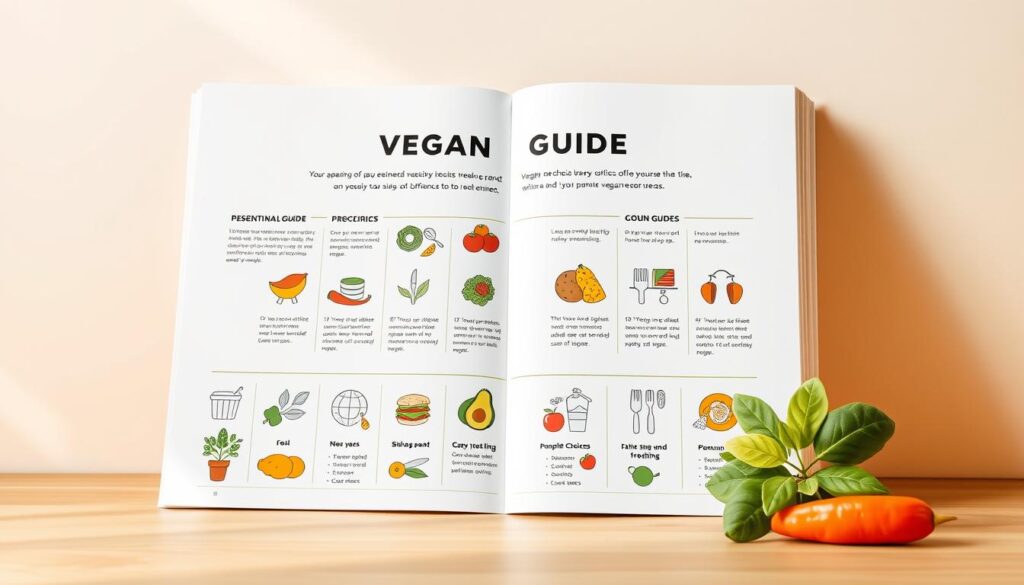
| Non-Vegan Item | Vegan Substitute | Benefits |
|---|---|---|
| Cow's Milk | Almond Milk | Lactose-free, lower in calories |
| Eggs | Chia Seeds | Rich in omega-3s, good for digestion |
| Chicken | Tofu | High protein, versatile |
| Butter | Coconut Oil | Plant-based fats, adds flavor |
This step-by-step vegan guide helps you start your vegan diet well. Remember, getting better takes time. Every little step is a big win. Enjoy your vegan journey!
Finding Vegan Communities and Support
Starting a vegan lifestyle can seem hard. But, finding vegan groups makes it easier. These places offer support, encouragement, and tips. I know how it feels.
Online sites like Facebook have big vegan groups. You can share recipes, find new products, and ask questions. Websites like Meetup.com and My Vegan Town list local vegan events. I've met great people there.
If you're shy, start with online groups. Just sending a message can lead to a great support system. Soon, you'll be going to events and maybe hosting vegan dinners.
Here’s how to connect with vegans:
- Join Facebook groups and talk with others.
- Find local vegan events on Meetup.com.
- Check forums on My Vegan Town for activities.
- Join online groups to feel more confident before meeting people in person.
- Bring a friend to events or go early to meet others.
Sharing food and new products with vegans makes the journey fun. Who doesn't love a potluck with friends who understand you?
So, whether you're new or experienced, join vegan groups. Your vegan journey will be better.
Ethical Reasons for Going Vegan
Many people choose veganism for reasons beyond food. It's about caring for animals and the planet. This choice leads to a lifestyle that's good for both.
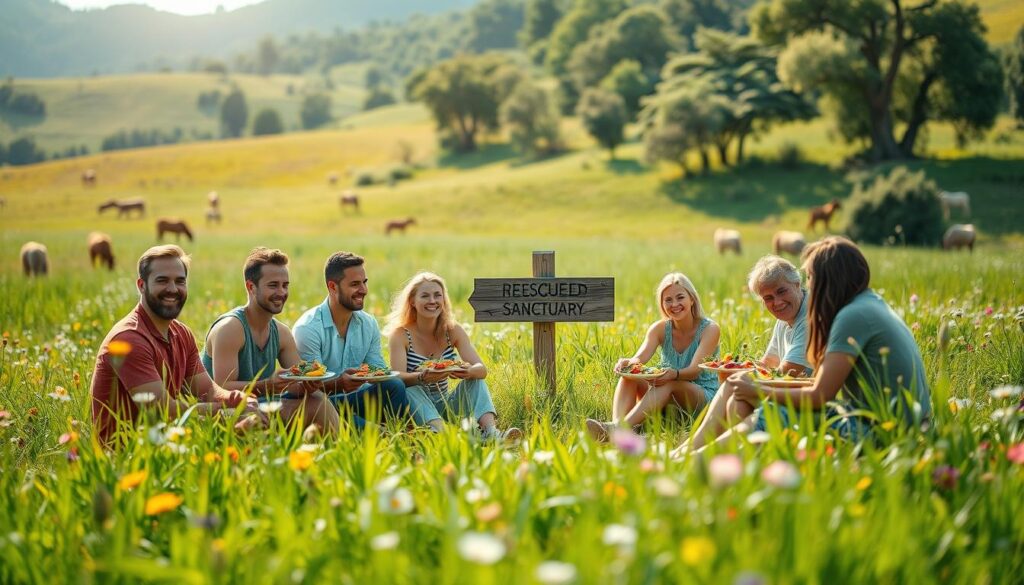
Animal Welfare
Ethical veganism fights against animal cruelty. Factory farms are very cruel. Animals live in bad conditions and are treated poorly.
By going vegan, we say no to this cruelty. We believe animals should be treated with kindness, just like us.
Environmental Impact
Veganism also helps the planet. The livestock industry harms our environment a lot. It causes climate change, deforestation, and pollutes water.
Choosing plants over meat lowers our carbon footprint. It saves water and land. Veganism is good for animals and our planet.
Managing Loneliness and Social Isolation
Starting a vegan lifestyle can be exciting but also lonely. You might feel left out from friends and family. It's tiring to always explain why you eat vegan.
But, it's possible to have a great vegan social life. This is key to overcoming loneliness.
First, look for people who think like you. Join vegan groups or online forums. These places offer support and friendship. You can find groups on meetup.com or Facebook.
“Alone, we can do so little; together, we can do so much.” – Helen Keller
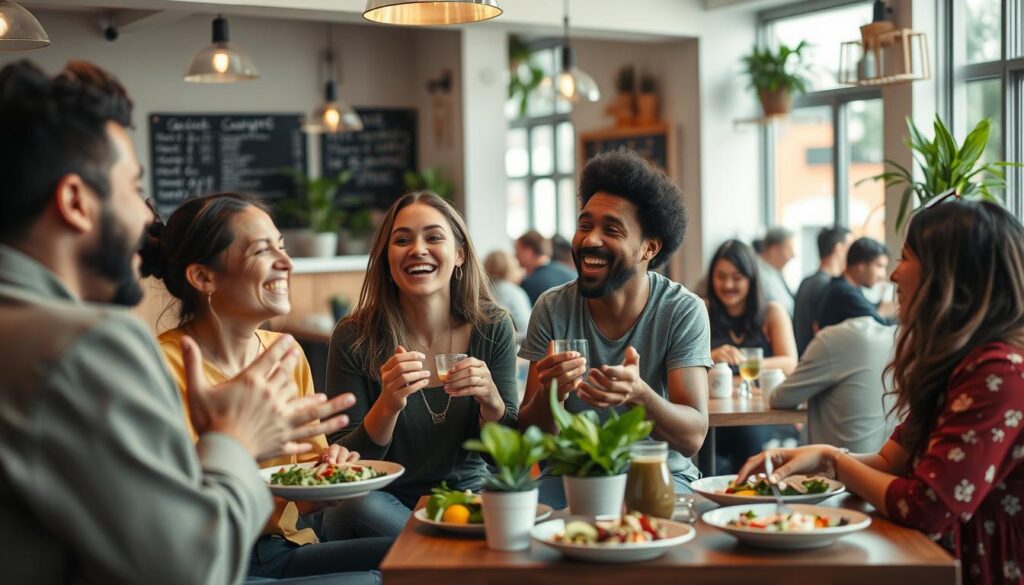
Being with others who share your values helps a lot. You can share food and stories. You might even find a new friend!
Also, teach others about veganism. Explaining why you choose it can help. You might inspire others to try it too. Take friends to vegan restaurants to share your lifestyle.
| Strategy | Benefits |
|---|---|
| Join Vegan Communities | Build a support network, share experiences |
| Host Vegan Potlucks | Increase social interactions, introduce vegan dishes |
| Educate Non-Vegan Friends | Foster understanding, reduce social friction |
| Attend Vegan Events | Meet like-minded people, enhance sense of belonging |
Managing loneliness as a vegan takes some work but is doable. Use these tips to grow your vegan social circle. Soon, you'll feel more connected and happy. 🌿
Transitioning at Different Life Stages
Starting a vegan lifestyle at 50 has its own set of challenges and benefits. It might seem hard, but it's worth it for your health. A 2018 Gallup poll showed 3% of people over 65 eat vegan. They feel better, with healthier hearts and more energy.
Going Vegan After 50
As we get older, our bodies need more care. Eating vegan means choosing foods high in protein to keep muscles strong. It's also important to get enough fatty acids for our brains and hearts.
Getting enough Vitamin B12 can be hard for older folks. But, just 15 minutes of sun a day can help with Vitamin D, which is good for bones.
Essential fatty acids play an important role in brain and heart health and can lower the chances of getting a heart attack.
Influence from Family Members
Family has a big impact on what we eat. Maybe a child or spouse inspired you to eat vegan. Talking about food choices and trying new vegan recipes together can help.
Being in a supportive family is key to a successful vegan lifestyle at 50. Whether it's for health reasons or family influence, going vegan can change your life for the better.
The Role of Mindset in a Successful Transition
Going vegan is more than just food. It's a journey of the mind too. The mindset for going vegan is key to enjoying this lifestyle. When I started, I didn't know how important the right mindset was.
Starting can be tough. But you're not alone. We all grew up eating animal products, so changing is a big mental step. The psychological aspects of veganism mean knowing why you're doing it and keeping that reason strong.
To make it simple, here's what worked for me:
- Education: Learning about veganism's benefits and science helped me stay strong.
- Community: Being part of groups helped me feel connected.
- Patience: Giving myself time to adjust and not expecting too much too soon.
| Mindset Strategy | Benefit |
|---|---|
| Setting Clear Goals | Helps maintain focus during challenging times. |
| Connecting with Community | Reduces feelings of isolation and provides support. |
| Continuous Learning | Maintains motivation by reinforcing the benefits of the vegan lifestyle. |
Seeing the mindset for going vegan as part of your journey helps. Approach it with an open heart and positivity. You'll find you're not just sticking to it, but really thriving.
Preparing for Social Occasions and Dining Out
Going to social events as a vegan can be hard. When you're out for vegan food, plan first. Call the restaurant and check their menu online. See what vegan choices they have.
If they don't have much, ask if they can make something special. Most chefs enjoy a challenge!
Being vegan at social events can be tricky. But, bring a dish to share. This way, you know you can eat something, and you might win over some friends with your vegan food. 😋
What if friends ask about your diet? Just say, “I feel better eating this way.” You don't have to explain unless they really want to know.
If you're going to an event with unknown food, eat a little before. This helps if there's no vegan food. It's all about being ready and sticking to your choices without trouble. These tips make eating out and going to events easier and more fun.
Finding Vegan Recipes and Meal Planning Tips
Starting with veganism can seem hard, but it's fun once you get the hang of it. You'll find tasty, easy meals with a little planning. Let's look at some great recipes and a vegan shopping guide to help you.
Staple Vegan Recipes
Every beginner needs some basic recipes. Here are my top picks:
- Chickpea Curry – A comforting dish that pairs well with rice.
- Tofu Stir-Fry – Quick and customizable with your choice of veggies.
- Vegan Pancakes – Perfect for a delightful weekend brunch.
- Lentil Soup – Nutritious and ideal for meal prepping.
- Classic Hummus – A versatile dip or spread for sandwiches and wraps.
These vegan recipes for beginners will give you a great start. Ready to make grocery shopping easier? Let's look at a vegan shopping guide.
Shopping List for Beginners
A good shopping list makes vegan living easier. Here's a basic vegan shopping guide to start with:
| Category | Items |
|---|---|
| Grains | Brown rice, quinoa, whole wheat pasta |
| Proteins | Tofu, lentils, chickpeas |
| Vegetables | Kale, broccoli, bell peppers |
| Fruits | Bananas, apples, berries |
| Dairy Alternatives | Almond milk, coconut yogurt |
| Snacks | Nuts, seeds, dried fruit |
| Condiments | Olive oil, soy sauce, tahini |
With this vegan shopping guide and simple vegan recipes, you're ready to start. Remember, keep trying new things and enjoy the journey. Happy cooking! 🥑🍴
Plant Based Cookbook
Starting a plant-based cooking journey is exciting and a bit scary. The right vegan cookbook recommendations can help a lot. Here are some great cookbooks for all tastes and skills. They make sure you always have tasty dishes to make:
- “Plenty More” by Yotam Ottolenghi – This book has lots of Middle Eastern dishes that are colorful and yummy. Ottolenghi's recipes are great for those who like strong flavors and don't mind spending time cooking.
- “Thug Kitchen: Eat Like You Give a F*ck” by Thug Kitchen – This cookbook is funny and has easy recipes. It's perfect for those who like a little humor in their cooking.
- “Isa Does It” by Isa Chandra Moskowitz – It's perfect for people who are always busy. Isa Chandra Moskowitz has quick, comforting vegan meals that are easy to make and don't need fancy stuff.
- “Forks Over Knives: The Cookbook” by Del Sroufe – This book is based on a documentary about eating plants. It has over 300 recipes that show healthy food can also taste great.
“Cooking from these books has made my vegan journey fun. Each page is a new discovery.” – An Enthuasiatic Vegan
Each vegan cookbook recommendation is special in its own way. Whether you're new to cooking or have been doing it for years, these books will help you grow. They make plant-based cooking a fun, ongoing adventure.
Conclusion
So there you have it folks, a deep dive into adopting a vegan lifestyle. You'll face challenges, but every step brings you closer to a healthier life. Learning to build nutritious meals and overcoming social challenges are part of the journey.
We've talked about nutritional concerns, finding support, and the ethical reasons for going vegan. The transition might seem hard, but it gets easier with time. Whether you care about animals or the planet, veganism offers many benefits.
In this summary, we see that going vegan is a journey of growth and helping others. So, go ahead and explore veganism with knowledge and hope. It's more than a diet; it's a life worth living. 🌱



